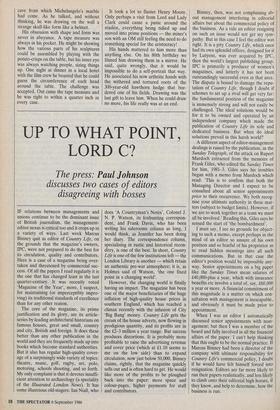UP TO WHAT POINT, LORD C?
The press: Paul Johnson
discusses two cases of editors disagreeing with bosses
IF relations between managements and unions continue to be the dominant issue of British journalism, the management- editor nexus is critical too and it crops up in a variety of ways. Last week Marcus Binney quit as editor of Country Life, on the grounds that the magazine's owners, IPC, were not prepared to do the best for its circulation, quality and contributors. Here is a case of a magazine being over- taken and threatened by commercial suc- cess. Of all the papers I read regularly it is the one that has changed least in the last quarter-century. It was recently voted `Magazine of the Year', more, I suspect, for maintaining (or imperceptibly impro- ving) its traditional standards of excellence than for any other reason.
The core of the magazine, its prime justification and its glory, are its article- series by leading architectural historians on famous houses, great and small, country and city, British and foreign. It does these better than any other publication in the world and they are frequently made up into books which become standard authorities. But it also has regular high-quality cover- age of a surprisingly wide variety of topics: theatre, music, golf, rugby, art, polo, motoring, schools shooting, and so forth. My only complaint is that it devotes insuffi- cient attention to archaeology (a speciality of the Illustrated London News). It has some illustrious old-stagers: Ian Niall, who does 'A Countryman's Notes', Colonel J. N. P. Watson, its foxhunting correspon- dent, and Frank Davis, who has been writing his salerooms column as long, I would think, as Jennifer has been doing her diary. The correspondence column, specialising in rustic and historical recon- ditry, is one of the best. In short, Country Life is one of the few institutions left — the London Library is another — which retain an authentic pre-war atmosphere; it is, as Holmes said of Watson, 'the one fixed point in a changing world'.
However, the changing world is finally having an impact. The magazine has been one of the major beneficiaries of the huge inflation of high-quality house prices in southern England, Which has reached a climax recently with the infusion of City `Big Bang' money. Country Life gets the cream of the house adverts, now flowing in prodigious quantity, and its profits are in the £2-3 million a year range. But success produces distortions. It is probably more profitable to raise the advertising revenue and cover price (which at £1.10 seems to me on the low side) than to expand circulation, now just below 50,000. Binney claims, rightly, that the magazine quickly sells out and is often hard to get. He would like more of the profits to be ploughed back into the paper: more space and colour-pages, higher payments for staff and contributors. Binney, then, was not complaining ab- out management interfering in editorial affairs but about the commercial policy of the business. As a rule an editor resigning on such an issue would not get my sym- pathy. But in this case I feel the editor was right. It is a pity Country Life, which once had its own splendid offices, designed for it by Lutyens, was ever acquired by IPC, then the world's largest publishing group. IPC is primarily a producer of women's magazines, and latterly it has not been outstandingly successful even in that area. The dispute is bound to damage the repu- tation of Country Life, though I doubt if schemes to set up a rival will get very far: the fundamental position of the magazine is immensely strong and will not easily be challenged. The ideal solutions would be for it to be owned and operated by an independent company which made the publication of Country Life its sole and dedicated business. But when do ideal solutions prevail in this harsh world?
A different aspect of editor-management dealings is raised by the publication, in the Sunday Telegraph, of the attack on Rupert Murdoch extracted from the memoirs of Frank Giles, who edited the Sunday Times for him, 1981-3. Giles says his troubles began with a memo from Murdoch which read: 'This is to confirm that both the Managing Director and I expect to be consulted about all senior appointments prior to their occurrence. We both recog- nise your ultimate authority in these mat- ters (subject to budget limits). However, if we are to work together as a team we must all be involved.' Reading this, Giles says he sensed the start of 'the bombardment'.
I must say, I see no grounds for object- ing to such a memo, except perhaps in the mind of an editor so unsure of his own position and so fearful of his proprietor as to read hidden meanings into all such communications. But in that case the editor's position would be impossible any- way. Senior appointments on a big paper like the Sunday Times mean salaries of £40,000-plus a year, which with insurance benefits etc involve a total of, say, £60,000 a year or more. A financial commitment of this magnitude is a matter on which con- sultation with management is inescapable, and obviously it must be made prior to appointment.
When I was an editor I automatically discussed senior appointments with man- agement; but then I was a member of the board and fully involved in all the financial affairs of the paper. I can't help thinking that this ought to be the normal practice. If Marcus Binney had been a director of the company with ultimate responsibility for Country Life's commercial policy, I doubt if he would have felt himself forced into resignation. Editors are far more likely to run their papers realistically, and less likely to climb onto their editorial high horses, if they know, and help to determine, how the business is run.






































 Previous page
Previous page